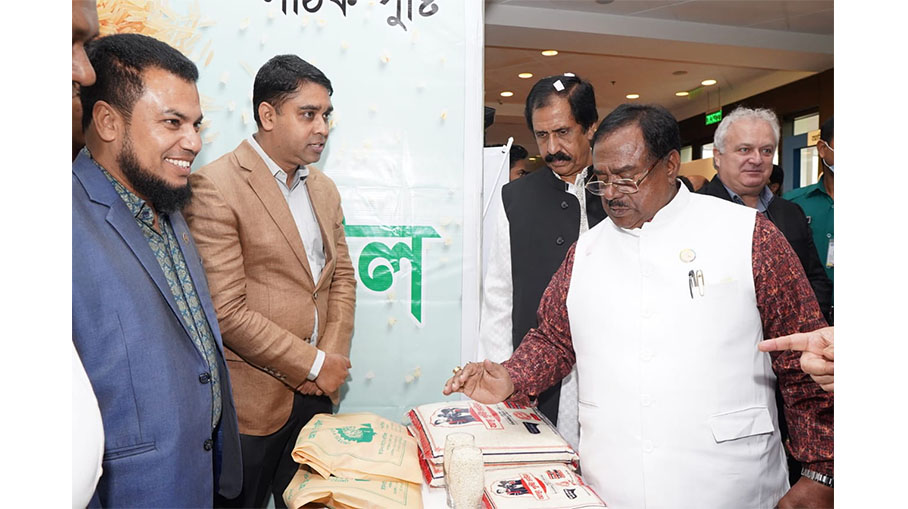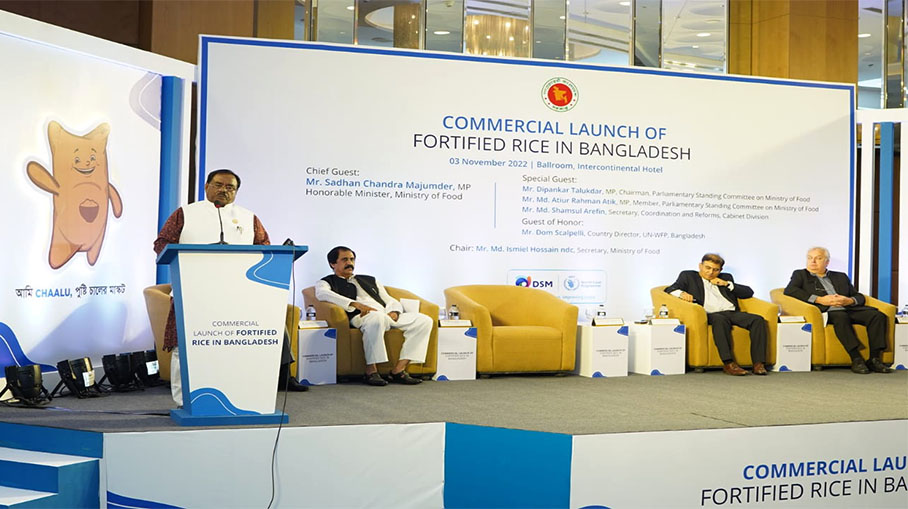Nutrition-rich fortified rice hits Bangladesh's market

Bangladesh on Thursday, in a significant public health move, made nutrition-rich fortified rice commercially available to reduce micronutrient deficiencies and improve nutrition outcomes among the population.
Food Minister Sadhan Chandra Majumder in a formal event while declaring fortified rice as a commercially available product in Bangladesh said: “We can address the micronutrient deficiencies through fortified rice distribution in a cost-effective manner.”
Fortified rice kernels look, taste and cook like any other rice but are enhanced with six essential vitamins and minerals: Vitamin A, Vitamin B1, Vitamin B12, Folic Acid, Iron and Zinc. They are mixed with ordinary rice at a ratio of 1:100.
The UN’s World Food Programme (WFP) introduced fortified rice distribution among social safety net beneficiaries in Bangladesh in 2013 as the government distributes 1.5 million MT of rice every year through that programme.

During Thursday's event, WFP’s Bangladesh chief Dom Scalpelli was also present. “Using rice as a medium presents a great opportunity to reduce micronutrient deficiencies in countries like Bangladesh where rice is a staple. It is also the most viable option in situations of limited resources, such as these times of global inflation and economic crisis,” he said.
The WFP said rice fortification provides an immediate, ready-to-use product that helps to address micronutrient deficiencies at a large scale. Fortified rice is one of the most effective means to address micronutrient deficiencies and improve nutrition outcomes in developing countries like Bangladesh.
Despite some progress, nutrition in Bangladesh remains a serious concern with a national prevalence of stunting at 28 percent, wasting at 9.8 percent and a persistent moderate to high prevalence of micronutrient deficiencies among preschool children (6-59 months).
“Therefore, micronutrient deficiencies as a form of under-nutrition are a significant public health issue,” according to the WFP that provides technical assistance to the government in this regard.
WFP also provides technical assistance to private fortified rice kernel manufacturing companies to fulfil the demand for fortified rice kernels and to the millers to establish blending units to have a smooth supply chain system in place.
Fortified rice distribution started with 30,000 beneficiaries in two sub-districts and by 2022 coverage had been expanded to reach more than 14 million beneficiaries in more than 320 sub-districts under two major safety net programmes of the government.
The latest micronutrient survey report (2019-2020) shows the deficiencies in some micronutrients have increased.
For Non-pregnant and Non-lactating (NPNL) women, the anemia rate has increased from 26% to 29%, overall Vitamin A deficiency is 7.5% and zinc deficiency is 43.4%.
For children under 5, the overall Vitamin A deficiency (mild to severe) is 50.9%, iron deficiency is 15% and zinc deficiency is 31%.
There are ongoing efforts to promote diversified diets, but without adequate resources to purchase a diverse diet, families overly rely on rice to meet their daily caloric needs. Rice is likely to dominate the diet of the people of Bangladesh for the foreseeable future, thus the fortification of rice with vitamins and minerals is an affordable means to significantly improve nutrition, health and economic status.

During the launching event, a panel discussion was also conducted with the keynote presentation on the evidence and innovation initiatives on fortified rice in Bangladesh. The panelists focused on policies and interventions for reducing micronutrient deficiencies through the scaling up of rice fortification initiatives.
Around 100 participants were present from different ministries, private companies and development partners at the event.
The Ministry of Food and WFP are supporting private fortified rice producers to introduce fortified rice in rural and urban retail markets at an affordable price aiming to reach the wider population suffering from undernutrition and prevalence of micronutrient deficiencies.
WFP has also provided capacity-building and knowledge transfer activities to over 178 fortified rice blending millers and 8 private fortified rice producers and facilitated coordination between the government and the association of fortified rice blending millers.
Dipankar Talukdar, MP, Chairman of the Parliamentary Standing Committee on Ministry of Food, Atiur Rahman Atik, MP, Member, Parliamentary Standing Committee on Ministry of Food, and Md Shamsul Arefin, Secretary, Coordination and Reforms, Cabinet Division Bangladesh Secretariat were also present, among others, during the event.



